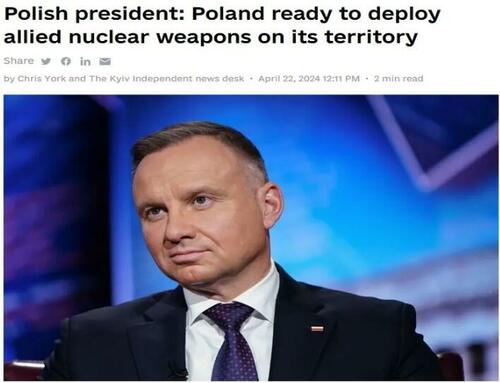Authored by Andrew Korybko via Substack,
Polish President Andrzej Duda confirmed in an interview during his latest trip to the US that “If our allies decide to deploy nuclear weapons as part of nuclear sharing also on our territory to strengthen the security of NATO's eastern flank, we are ready for it. We are an ally in the North Atlantic Alliance, and we also have obligations in this respect, i.e., we simply implement a common policy.”
As a reminder, the Russian Ambassador to Poland told RT earlier this month that the US has yet to oblige Poland’s offer.
He didn’t elaborate why, but it’s not anything new that Poland wants to host American nukes. The only reason why it’s newsworthy is because his confirmation of this intent comes after his latest trip to the US and ahead of NATO’s next annual summit in early July.
Moreover, if one reads between the lines, his reference to “our allies” as opposed to the US (the specific country whose nukes he was asked about hosting by his interlocutor) suggests that Poland could possibly host British nukes.
The Anglo-American Axis works in tandem to wage NATO’s proxy war on Russia through Ukraine, and each has excellent bilateral ties with Poland. The UK has also shown itself to be more “daring” in terms of openly provoking Russia than the US has as proven by its Storm Shadow cruise missiles and assistance to Ukraine in striking civilian targets like the Crimean Bridge and cities in Kherson Region. It therefore wouldn’t be far-fetched if they one day deploy their nukes to Poland before the US or instead of it.
Extrapolating the motives at play, the first scenario could be intended to move the needle inside the US in the direction of following suit just like prior weapons deliveries were intended. As for the second, it could be due to the UK’s desire to maintain its “sphere of influence” in the region via “Three Seas Initiative”-leader Poland amidst Germany’s immense gains there since its change of government. In that case, the US could approve of it so as to keep Germany’s continental influence in check via the UK.
To be clear, there’s no credible indication that either member of the Anglo-American Axis is interested in deploying nukes to Poland, who’s been asking the US to do so but to no avail. Any positive decision would be driven by purely political motives since there’s no military necessity for adding Poland to the nuclear-sharing program. It would be presented as a tit-for-tat after Russia deployed tactical nukes in Belarus after NATO’s saber-rattling whereas Russia hasn’t saber-rattled against the bloc in any way.
The blowback, however, could be that Germany gets jealous and begins to fear that its continental influence is being partly replaced by Poland due to the Anglo-American Axis’ favoritism towards it. The EU’s de facto leader already hosts US nukes and more of its partner’s military forces than any country in Europe so expanding the abovementioned program to Poland could make it wonder about their plans. In that event, it might not be as willing to obey their demands vis-à-vis Russia and soon China.
In order to not be misunderstood, Germany wouldn’t “defect” from NATO to the Sino-Russo Entente in any way, it might only be more reluctant to sacrifice its objective national interests (mostly economic in this context) than if it felt comfortable with its perceived prestige over Poland. Germany would probably do their bidding anyhow at the end of the day, but it would be easier for them if it didn’t feel offended by Poland sharing in some of the perceived prestige of hosting nuclear weapons.
Considering the interests at play, while it can’t be ruled out that the Anglo-American Axis might agree to deploy nukes to Poland – whether around the time of NATO’s next summit in early July or sometime afterwards – there’s no reason to expect that it’ll happen anytime soon unless something changes.
If Russia achieves a military breakthrough across the front lines, irrespective of whether this prompts a conventional NATO intervention, then that could potentially serve as a tripwire for this scenario.
Source link


